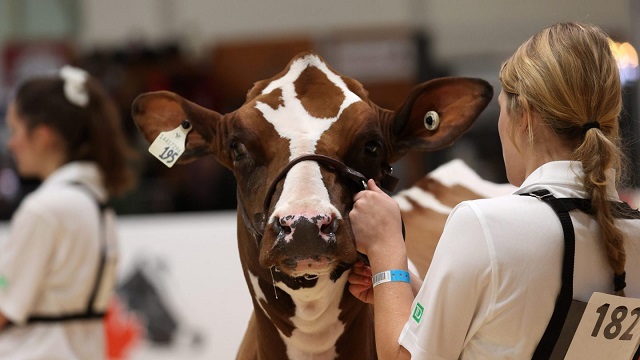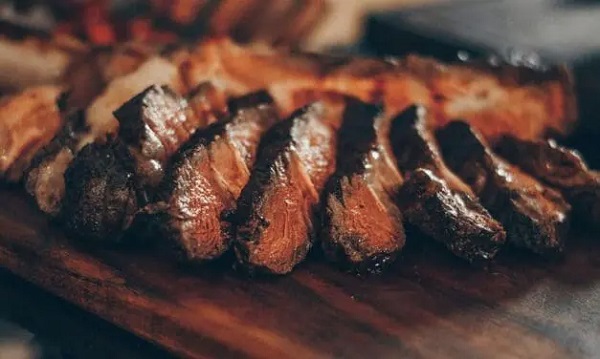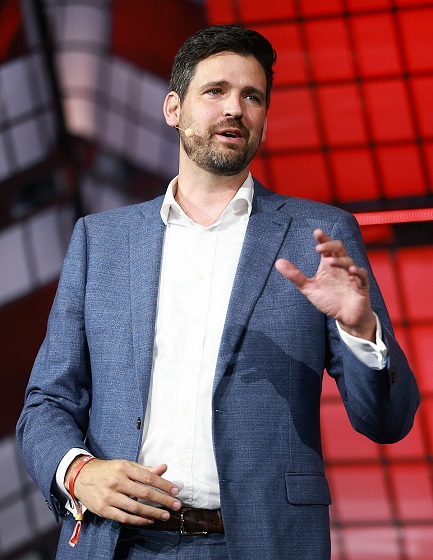Agriculture
How oil and gas support food security in Canada and around the world

General view of the ‘TD Canadian 4-H Dairy Classic Showmanship’ within the 101st edition of Royal Agricultural Winter Fair at Exhibition Place in Toronto, Ontario, on November 6, 2023. The Royal is the largest combined indoor agriculture fair and international equestrian competition in the world. Getty Images photo
From the Canadian Energy Centre
‘Agriculture requires fuel, and it requires lubricants. It requires heat and electricity. Modern agriculture can’t be done without energy’
Agriculture and oil and gas are two of Canada’s biggest businesses – and they are closely linked, industry leaders say.
From nitrogen-based fertilizer to heating and equipment fuels, oil and gas are the backbone of Canada’s farms, providing food security for Canadians and exports to nearly 200 countries around the world.
“Canada is a country that is rich in natural resources, and we are among the best, I would even characterize as the best, in terms of the production of sustainable energy and food, not only for Canadians but for the rest of the world,” said Don Smith, chief operating officer of the United Farmers of Alberta Co-operative.
“The two are very closely linked together… Agriculture requires fuel, and it requires lubricants. It requires heat and electricity. Modern agriculture can’t be done without energy, and it is a significant portion of operating expenses on a farm.”
The need for stable food sources is critical to a global economy whose population is set to reach 9.7 billion people by 2050.
The main pillars of food security are availability and affordability, said Keith Currie, president of the Canadian Federation of Agriculture (CFA).
“In Canada, availability is not so much an issue. We are a very productive country when it comes to agriculture products and food products. But food affordability has become an issue for a number of people,” said Currie, who is also on the advisory council for the advocacy group Energy for a Secure Future.
The average price of food bought in stores increased by nearly 25 per cent over the last five years, according to Statistics Canada.
Restricting access to oil and gas, or policies like carbon taxes that increase the cost for farmers to use these fuels, risk increasing food costs even more for Canadians and making Canadian food exports less attractive to global customers, CFA says.
“Canada is an exporting nation when it comes to food. In order for us to be competitive we not only have to have the right trade deals in place, but we have to be competitive price wise too,” Currie said.

Under an incredible Saskatchewan sky, a farmer walks toward his air seeder to begin the process of planting this year’s crop. Getty Images photo
Canada is the fifth-largest exporter of agri-food and seafood in the world, exporting approximately $93 billion of products in 2022, according to Agriculture Canada.
Meanwhile, Canadians spent nearly $190 billion on food, beverage, tobacco and cannabis products in 2022, representing the third-largest household expenditure category after transportation and shelter.
Currie said there are opportunities for renewable energy to help supplement oil and gas in agriculture, particularly in biofuels.
“But we’re not at a point from a production standpoint or an overall infrastructure standpoint where it’s a go-to right away,” he said.
“We need the infrastructure and we need probably a lot of incentives before we can even think about moving away from the oil and gas sector as a supplier of energy right now.”
Worldwide demand for oil and gas in the agriculture sector continues to grow, according to CEC Research.
Driven by Africa and Latin America, global oil use in agriculture increased to 118 million tonnes of oil equivalent (Mtoe) in 2022, up from 110 million tonnes in 1990.
Demand for natural gas also increased — from 7.5 Mtoe in 1990 to 11 Mtoe in 2022.
Sylvain Charlebois, senior director, in the Agri-Food Analytics Lab at Dalhousie University, said food security depends on three pillars – access, safety, and affordability.
“Countries are food secure on different levels. Canada’s situation I think is envious to be honest. I think we’re doing very well compared to other countries, especially when it comes to safety and access,” said Charlebois.
“If you have a food insecure population, civil unrest is more likely, tensions, and political instability in different regions become more of a possibility.”
As a country, access to affordable energy is key as well, he said.
“The food industry highly depends on energy sources and of course food is energy. More and more we’re seeing a convergence of the two worlds – food and energy… It forces the food sector to play a much larger role in the energy agenda of a country like Canada.”
Agriculture
Danish Cows Collapsing Under Mandatory Methane-Reducing Additive

Cow feed additive Bovaer meant to curb climate change seems to be killing some Danish dairy cows
Since October 1, 2025, when many Danish dairy farmers began incorporating the synthetic additive Bovaer (containing 3-nitrooxypropanol) into their cows’ feed—alarming reports have come in of animals suffering from: stomach cramps, fevers, miscarriages, drastic drops in milk production, sudden collapses and in some cases, the need to be euthanized.
The first farmer from Denmark comes forward and talks about sick and dead cows, after giving his cows the Bovaer poison. 10/28 25. Remember that waste products from Bovaer, are passed on in milk and meat.
Short version video.
Boycott Arla and share, share, share. pic.twitter.com/fXzHgfWP3G
— Kent Nielsen Denmark (@Kentfrihedniels) October 30, 2025
In the shocking video below, Danish farmer Rene Lillehjælper discusses how her husband is driving their “cow ambulance” tractor— transporting yet another collapsed cow from their dairy farm—because of the “Bovaer Poison.”
Marketed as a “climate-friendly” methane reducer, this product—produced by the Dutch-Swiss giant DSM-Firmenich—became a legal requirement for Danish dairy farmers to add into their animal feed for 80 days or for their cows to be fed extra fat throughout the year.
Notably, farmers experimenting by removing Bovaer saw their herds recover rapidly, only for symptoms to return upon reintroduction. Yet, despite these red flags, authorities insist on pushing ahead, with an investigation only now underway.
These reports build on the concerns I outlined in my November 2024 investigation into Arla’s UK trials, where EFSA tolerance studies highlighted issues such as reduced feed intake, decreased organ weights (including ovaries and heart), and altered enzyme levels in cows at elevated doses—yet these effects were ultimately classified as “non-adverse” by regulators.
BREAKING: Methane-Reducing Feed Additive Trialled in Arla Dairy Farms
On November 26th, Arla Foods Ltd. announced via social media their collaboration with major UK supermarkets like Tesco, Aldi, and Morrisons to trial Bovaer, a feed additive, aiming to reduce methane …
What was even more troubling were the findings from my analysis of the safety assessment report, prepared by the UK’s Food Standards Agency (FSA) and Food Standards Scotland (FSS), reviewed by Animal Feed and Feed Additives Joint Expert Group (AFFAJEG) and the Advisory Committee on Animal Feedingstuffs (ACAF).
It stated: “In relation to safety studies for the consumer, a 2-year carcinogenicity study in Wistar rats showed “mesenchymal cell tumours were reported in 4 out of 49 females at the top dose of 300 mg/kg bw/day of 3-NOP given orally. Based on these results, the original study report concluded there was evidence of carcinogenicity in female rats.”
AFFAJEG noted potential for mesenchymal cell hyperplasia and benign tumours at high doses but, citing no malignant tumours or genotoxicity, concluded the additive is not carcinogenic at recommended inclusion rates.
ACAF echoed that the additive “can be considered safe for consumers.” Yet, their conclusion was seemingly contradicted by the following statement: “The additive should be considered corrosive to the eyes, a skin irritant and potentially harmful by inhalation.”
In a separate development, a May 2024 FDA letter addressed to Elanco US, Inc, (which has an agreement with DSM-Firmenich to market Bovaer) stated: “Based on a review of your data and the characteristics of your product, FDA has no questions at this time regarding whether Bovaer® 10 will achieve its intended effect and is expected to pose low risk to humans or animals under the conditions of its intended use.”
Ironically, the FDA letter included an attachment with the following warning:

It should be noted that Bovaer passed the FDA review in under 12 months—much shorter than industry standard.
Kjartan Poulsen, chairman of the National Association of Danish Dairy Producers, has received numerous calls from concerned farmers. “We have so many people who call us and are unhappy about what is happening in their herds,” he shared with TV 2.
He described the recurring issues as unusual and is urging reports of suspected Bovaer-linked miscarriages. Poulsen emphasized that any animal harm undermines the additive’s purpose: “This should give a climate effect – and if cows die from this, or they produce less milk, then the effect is minus.” He is calling for a temporary pause from Agriculture Minister Jacob Jensen and for farmers to cease use if welfare issues arise.
Approved by the European Commission in 2022 based on EFSA assessments, Bovaer was deemed safe for cows, consumers, and the environment, with claims of up to 30-45% methane reduction.
However, field experiences differ. Reports from Jyllands-Posten and TV 2 describe lower milk yields tied to miscarriages, plus collapses—some cows recovering with treatment but others needing to be euthanised.
Earlier whispers from Danish farmers included fevers, diarrhoea, mastitis, and even cow deaths attributed to Bovaer. One producer lost six animals in under a month. Critics label it “animal cruelty,” especially under mandatory use for farms with over 50 cows.
The Danish Veterinary and Food Administration acknowledges these reports and has enlisted Aarhus University to analyse real-world data, with initial findings expected after the 2025-26 new year.
The irony is stark: a product meant to “save the planet” for reducing methane is harmful to dairy herds, slashing productivity, and raising fears of contaminating the food chain—despite assurances it “breaks down fully” with no residues.
Yet, the true winners emerge clearly: DSM-Firmenich, cashing in on booming sales fuelled by mandates and climate subsidies, alongside powerhouse investors like BlackRock (holding ~3.3%) and Vanguard, who reap the rewards from this relentless Net-Zero drive.
If you appreciate the hard work that I do as an independent investigative journalist,
please consider supporting me with a paid subscription.
Agriculture
Cloned foods are coming to a grocer near you

This article supplied by Troy Media.
And you may never find out if Health Canada gets its way
Cloned-animal foods could soon enter Canada’s food supply with no labels identifying them as cloned and no warning to consumers—a move that risks public trust.
According to Health Canada’s own consultation documents, Ottawa intends to remove foods derived from cloned animals from its “novel foods” list, the process that requires a pre-market safety review and public disclosure. Health Canada defines “novel
foods” as products that haven’t been commonly consumed before or that use new production processes requiring extra safety checks.
From a regulatory standpoint, this looks like an efficiency measure. From a consumer-trust standpoint, it’s a miscalculation.
Health Canada argues that cloned animals and their offspring are indistinguishable from conventional ones, so they should be treated the same. The problem isn’t the science—it’s the silence. Canadians are not being told that the rules for a controversial technology are about to change. No press release, no public statement, just a quiet update on a government website most citizens will never read.
Cloning in agriculture means producing an exact genetic copy of an animal, usually for breeding purposes. The clones themselves rarely end up on dinner plates, but their offspring do, showing up in everyday products such as beef, milk or pork. The benefits are indirect: steadier production, fewer losses from disease or more uniform quality.
But consumers see no gain at checkout. Cloning is expensive and brings no visible improvement in taste, nutrition or price.
Shoppers could one day buy steak from the offspring of a cloned cow without any way of knowing, and still pay the same, if not more, for it.
Without labels identifying cloned origin, potential efficiencies stay hidden upstream. When products born from new technologies are mixed with conventional ones, consumers lose their ability to differentiate, reward innovation or make an informed choice. In the end, the industry keeps the savings while shoppers see none.
And it isn’t only shoppers left in the dark. Exporters could soon pay the price too. Canada exports billions in beef and pork annually, including to the EU. If cloned origin products enter the supply chain without labelling, Canadian exporters could face additional scrutiny or restrictions in markets where cloning is not accepted. A regulatory shortcut at home could quickly become a market barrier abroad.
This debate comes at a time when public trust in Canada’s food system is already fragile. A 2023 survey by the Canadian Centre for Food Integrity found that only 36 per cent of Canadians believe the food industry is “heading in the right direction,” and fewer than half trust government regulators to be transparent.
Inserting cloned foods quietly into the supply without disclosure would only deepen that skepticism.
This is exactly how Canada became trapped in the endless genetically modified organism (GMO) debate. Two decades ago, regulators and companies quietly introduced a complex technology without giving consumers the chance to understand it. By denying transparency, they also denied trust. The result was years of confusion, suspicion and polarization that persist today.
Transparency shouldn’t be optional in a democracy that prides itself on science based regulation. Even if the food is safe, and current evidence suggests it is, Canadians deserve to know how what they eat is produced.
The irony is that this change could have been handled responsibly. Small gestures like a brief notice, an explanatory Q&A or a commitment to review labelling once international consensus emerges would have shown respect for the public and preserved confidence in our food system.
Instead, Ottawa risks repeating an old mistake: mistaking regulatory efficiency for good governance. At a time when consumer trust in food pricing, corporate ethics and government oversight is already fragile, the last thing Canada needs is another quiet policy that feels like a secret.
Cloning may not change the look or taste of what’s on your plate, but how it gets there should still matter.
Dr. Sylvain Charlebois is a Canadian professor and researcher in food distribution and policy. He is senior director of the Agri-Food Analytics Lab at Dalhousie University and co-host of The Food Professor Podcast. He is frequently cited in the media for his insights on food prices, agricultural trends, and the global food supply chain.
Troy Media empowers Canadian community news outlets by providing independent, insightful analysis and commentary. Our mission is to support local media in helping Canadians stay informed and engaged by delivering reliable content that strengthens community connections and deepens understanding across the country.
-

 COVID-192 days ago
COVID-192 days agoFreedom Convoy leader Tamara Lich to appeal her recent conviction
-

 Justice2 days ago
Justice2 days agoCarney government lets Supreme Court decision stand despite outrage over child porn ruling
-

 espionage1 day ago
espionage1 day agoU.S. Charges Three More Chinese Scholars in Wuhan Bio-Smuggling Case, Citing Pattern of Foreign Exploitation in American Research Labs
-

 Daily Caller2 days ago
Daily Caller2 days agoUN Chief Rages Against Dying Of Climate Alarm Light
-

 Business2 days ago
Business2 days agoCarney’s budget spares tax status of Canadian churches, pro-life groups after backlash
-

 Business24 hours ago
Business24 hours agoCarney budget doubles down on Trudeau-era policies
-

 COVID-191 day ago
COVID-191 day agoCrown still working to put Lich and Barber in jail
-

 Business24 hours ago
Business24 hours agoCarney budget continues misguided ‘Build Canada Homes’ approach










